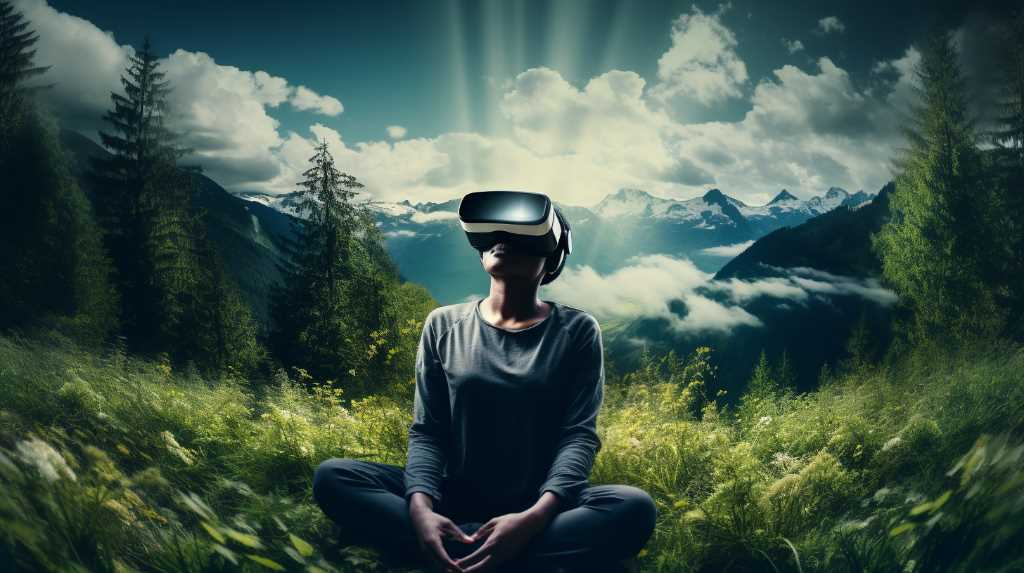Are you looking for a groundbreaking way to improve your mental health and find relaxation? Look no further than virtual reality therapy. With VR, you can immerse yourself in therapeutic environments and explore techniques designed to unlock the healing power of this technology.
Discover the positive impact VR can have on your mental well-being and take the first steps towards a healthier and more relaxed you. Get ready to dive into the world of VR and explore its incredible potential for therapy.
 You should consider trying virtual reality therapy as a new way to treat mental health concerns. Virtual reality therapy is a cutting-edge approach that uses technology to create immersive and interactive experiences for therapeutic purposes. Instead of traditional talk therapy or medication, virtual reality therapy offers a unique and innovative way to address mental health issues.
One of the key advantages of virtual reality therapy is its ability to provide a safe and controlled environment for individuals to confront their fears and anxieties. Whether it's a fear of flying, public speaking, or even a traumatic event, virtual reality therapy can simulate these scenarios and allow individuals to gradually face their fears in a controlled setting. This can be particularly beneficial for people with phobias, post-traumatic stress disorder (PTSD), and anxiety disorders.
Moreover, virtual reality therapy can also be used to promote relaxation and stress reduction. Through virtual reality experiences, you can be transported to serene and calming environments, such as a peaceful beach or a tranquil forest. These immersive environments can help you escape from the stresses of everyday life and provide a much-needed mental break.
You should consider trying virtual reality therapy as a new way to treat mental health concerns. Virtual reality therapy is a cutting-edge approach that uses technology to create immersive and interactive experiences for therapeutic purposes. Instead of traditional talk therapy or medication, virtual reality therapy offers a unique and innovative way to address mental health issues.
One of the key advantages of virtual reality therapy is its ability to provide a safe and controlled environment for individuals to confront their fears and anxieties. Whether it's a fear of flying, public speaking, or even a traumatic event, virtual reality therapy can simulate these scenarios and allow individuals to gradually face their fears in a controlled setting. This can be particularly beneficial for people with phobias, post-traumatic stress disorder (PTSD), and anxiety disorders.
Moreover, virtual reality therapy can also be used to promote relaxation and stress reduction. Through virtual reality experiences, you can be transported to serene and calming environments, such as a peaceful beach or a tranquil forest. These immersive environments can help you escape from the stresses of everyday life and provide a much-needed mental break.
 Immersive VR experiences offer a unique opportunity to enhance your mental health and well-being, as they can provide a sense of calmness and tranquility. Imagine stepping into a virtual world where you can escape the stresses of daily life and find solace in a peaceful environment. With the use of virtual reality technology, you can explore breathtaking landscapes, relax on a virtual beach, or even meditate in a serene forest setting.
Studies have shown that immersive VR experiences have the potential to reduce anxiety, alleviate symptoms of depression, and improve overall mental well-being. By immersing yourself in a virtual environment, you can temporarily disconnect from the outside world and focus on your own thoughts and emotions. This can be especially beneficial for individuals who struggle with traditional forms of therapy or find it difficult to relax in real-life settings.
Furthermore, immersive VR experiences can also provide a safe space for exposure therapy, allowing individuals to confront and overcome their fears in a controlled and supportive environment. Whether it's facing a fear of heights or overcoming social anxiety, virtual reality can simulate real-life scenarios and help you build resilience and confidence.
Immersive VR experiences offer a unique opportunity to enhance your mental health and well-being, as they can provide a sense of calmness and tranquility. Imagine stepping into a virtual world where you can escape the stresses of daily life and find solace in a peaceful environment. With the use of virtual reality technology, you can explore breathtaking landscapes, relax on a virtual beach, or even meditate in a serene forest setting.
Studies have shown that immersive VR experiences have the potential to reduce anxiety, alleviate symptoms of depression, and improve overall mental well-being. By immersing yourself in a virtual environment, you can temporarily disconnect from the outside world and focus on your own thoughts and emotions. This can be especially beneficial for individuals who struggle with traditional forms of therapy or find it difficult to relax in real-life settings.
Furthermore, immersive VR experiences can also provide a safe space for exposure therapy, allowing individuals to confront and overcome their fears in a controlled and supportive environment. Whether it's facing a fear of heights or overcoming social anxiety, virtual reality can simulate real-life scenarios and help you build resilience and confidence.
 By exploring therapeutic environments in virtual reality, you can experience healing and relaxation in a whole new way. Virtual reality (VR) technology has revolutionized various industries, and now it's making its mark in the field of therapy. With VR, you can immerse yourself in a digital world that's specifically designed to promote healing and relaxation.
Imagine being able to escape to a tranquil beach, surrounded by the soothing sounds of waves crashing and feeling the warm sand beneath your feet. Or picture yourself in a serene forest, surrounded by lush greenery and the calming sounds of chirping birds. These virtual environments can transport you to a place of peace and tranquility, allowing you to disconnect from the stresses of everyday life.
But the benefits of therapeutic VR go beyond just relaxation. Research has shown that virtual reality therapy can be effective in treating a range of mental health conditions, such as anxiety disorders and post-traumatic stress disorder. By exposing individuals to controlled and immersive environments, therapists can help them confront and overcome their fears in a safe and supportive way.
In addition, VR therapy can provide a safe space for individuals to practice and develop coping mechanisms for real-life situations. For example, someone with social anxiety can use VR to simulate social interactions and gradually build their confidence.
Overall, therapeutic environments in virtual reality offer a whole new level of healing and relaxation. They provide a safe and controlled space for individuals to confront their fears, develop coping mechanisms, and find solace in peaceful virtual worlds.
By exploring therapeutic environments in virtual reality, you can experience healing and relaxation in a whole new way. Virtual reality (VR) technology has revolutionized various industries, and now it's making its mark in the field of therapy. With VR, you can immerse yourself in a digital world that's specifically designed to promote healing and relaxation.
Imagine being able to escape to a tranquil beach, surrounded by the soothing sounds of waves crashing and feeling the warm sand beneath your feet. Or picture yourself in a serene forest, surrounded by lush greenery and the calming sounds of chirping birds. These virtual environments can transport you to a place of peace and tranquility, allowing you to disconnect from the stresses of everyday life.
But the benefits of therapeutic VR go beyond just relaxation. Research has shown that virtual reality therapy can be effective in treating a range of mental health conditions, such as anxiety disorders and post-traumatic stress disorder. By exposing individuals to controlled and immersive environments, therapists can help them confront and overcome their fears in a safe and supportive way.
In addition, VR therapy can provide a safe space for individuals to practice and develop coping mechanisms for real-life situations. For example, someone with social anxiety can use VR to simulate social interactions and gradually build their confidence.
Overall, therapeutic environments in virtual reality offer a whole new level of healing and relaxation. They provide a safe and controlled space for individuals to confront their fears, develop coping mechanisms, and find solace in peaceful virtual worlds.
 Fortunately, there are various techniques available for exploring VR therapy and its potential benefits. If you're curious about how virtual reality can be used in therapy, here are three techniques to consider:
Fortunately, there are various techniques available for exploring VR therapy and its potential benefits. If you're curious about how virtual reality can be used in therapy, here are three techniques to consider:
 Are you ready to discover the positive impact VR can have on your mental health by unlocking its benefits? Virtual Reality (VR) has revolutionized the way we experience the world around us, and now it's making waves in the field of mental health. With the ability to transport you to different environments and create immersive experiences, VR has the potential to provide therapeutic benefits for a wide range of mental health conditions.
One of the key advantages of VR therapy is its ability to create a safe and controlled environment. For individuals struggling with anxiety or phobias, VR can simulate scenarios that trigger their fears, allowing them to confront and overcome them in a controlled setting. This exposure therapy has been proven to be highly effective in treating conditions such as post-traumatic stress disorder (PTSD) and specific phobias.
Moreover, VR can also be used for relaxation and stress reduction. By immersing yourself in a calming virtual environment, you can escape the pressures of the real world and find solace in a tranquil setting. This can be particularly beneficial for individuals dealing with chronic stress or anxiety, providing them with a much-needed respite and promoting mental well-being.
In addition, VR therapy offers a level of accessibility that traditional therapy may not always provide. It can be particularly useful for individuals who are unable to leave their homes or have limited access to mental health services. VR therapy sessions can be conducted remotely, allowing individuals to receive the support they need from the comfort of their own homes.
Overall, VR has the potential to be a game-changer in the field of mental health. By harnessing its immersive capabilities, we can unlock its benefits and provide effective and accessible therapy to individuals in need. So, are you ready to explore the positive impact VR can have on your mental health? The possibilities are endless.
Are you ready to discover the positive impact VR can have on your mental health by unlocking its benefits? Virtual Reality (VR) has revolutionized the way we experience the world around us, and now it's making waves in the field of mental health. With the ability to transport you to different environments and create immersive experiences, VR has the potential to provide therapeutic benefits for a wide range of mental health conditions.
One of the key advantages of VR therapy is its ability to create a safe and controlled environment. For individuals struggling with anxiety or phobias, VR can simulate scenarios that trigger their fears, allowing them to confront and overcome them in a controlled setting. This exposure therapy has been proven to be highly effective in treating conditions such as post-traumatic stress disorder (PTSD) and specific phobias.
Moreover, VR can also be used for relaxation and stress reduction. By immersing yourself in a calming virtual environment, you can escape the pressures of the real world and find solace in a tranquil setting. This can be particularly beneficial for individuals dealing with chronic stress or anxiety, providing them with a much-needed respite and promoting mental well-being.
In addition, VR therapy offers a level of accessibility that traditional therapy may not always provide. It can be particularly useful for individuals who are unable to leave their homes or have limited access to mental health services. VR therapy sessions can be conducted remotely, allowing individuals to receive the support they need from the comfort of their own homes.
Overall, VR has the potential to be a game-changer in the field of mental health. By harnessing its immersive capabilities, we can unlock its benefits and provide effective and accessible therapy to individuals in need. So, are you ready to explore the positive impact VR can have on your mental health? The possibilities are endless.
Key Takeaways
- Virtual reality therapy is a cutting-edge approach that uses technology for therapeutic purposes.
- It offers a unique and innovative way to address mental health issues.
- Virtual reality therapy provides a safe and controlled environment for individuals to confront fears and anxieties.
- It promotes relaxation and stress reduction through immersive experiences.
The Rise of Virtual Reality Therapy
 You should consider trying virtual reality therapy as a new way to treat mental health concerns. Virtual reality therapy is a cutting-edge approach that uses technology to create immersive and interactive experiences for therapeutic purposes. Instead of traditional talk therapy or medication, virtual reality therapy offers a unique and innovative way to address mental health issues.
One of the key advantages of virtual reality therapy is its ability to provide a safe and controlled environment for individuals to confront their fears and anxieties. Whether it's a fear of flying, public speaking, or even a traumatic event, virtual reality therapy can simulate these scenarios and allow individuals to gradually face their fears in a controlled setting. This can be particularly beneficial for people with phobias, post-traumatic stress disorder (PTSD), and anxiety disorders.
Moreover, virtual reality therapy can also be used to promote relaxation and stress reduction. Through virtual reality experiences, you can be transported to serene and calming environments, such as a peaceful beach or a tranquil forest. These immersive environments can help you escape from the stresses of everyday life and provide a much-needed mental break.
You should consider trying virtual reality therapy as a new way to treat mental health concerns. Virtual reality therapy is a cutting-edge approach that uses technology to create immersive and interactive experiences for therapeutic purposes. Instead of traditional talk therapy or medication, virtual reality therapy offers a unique and innovative way to address mental health issues.
One of the key advantages of virtual reality therapy is its ability to provide a safe and controlled environment for individuals to confront their fears and anxieties. Whether it's a fear of flying, public speaking, or even a traumatic event, virtual reality therapy can simulate these scenarios and allow individuals to gradually face their fears in a controlled setting. This can be particularly beneficial for people with phobias, post-traumatic stress disorder (PTSD), and anxiety disorders.
Moreover, virtual reality therapy can also be used to promote relaxation and stress reduction. Through virtual reality experiences, you can be transported to serene and calming environments, such as a peaceful beach or a tranquil forest. These immersive environments can help you escape from the stresses of everyday life and provide a much-needed mental break.
Immersive VR Experiences for Mental Health
 Immersive VR experiences offer a unique opportunity to enhance your mental health and well-being, as they can provide a sense of calmness and tranquility. Imagine stepping into a virtual world where you can escape the stresses of daily life and find solace in a peaceful environment. With the use of virtual reality technology, you can explore breathtaking landscapes, relax on a virtual beach, or even meditate in a serene forest setting.
Studies have shown that immersive VR experiences have the potential to reduce anxiety, alleviate symptoms of depression, and improve overall mental well-being. By immersing yourself in a virtual environment, you can temporarily disconnect from the outside world and focus on your own thoughts and emotions. This can be especially beneficial for individuals who struggle with traditional forms of therapy or find it difficult to relax in real-life settings.
Furthermore, immersive VR experiences can also provide a safe space for exposure therapy, allowing individuals to confront and overcome their fears in a controlled and supportive environment. Whether it's facing a fear of heights or overcoming social anxiety, virtual reality can simulate real-life scenarios and help you build resilience and confidence.
Immersive VR experiences offer a unique opportunity to enhance your mental health and well-being, as they can provide a sense of calmness and tranquility. Imagine stepping into a virtual world where you can escape the stresses of daily life and find solace in a peaceful environment. With the use of virtual reality technology, you can explore breathtaking landscapes, relax on a virtual beach, or even meditate in a serene forest setting.
Studies have shown that immersive VR experiences have the potential to reduce anxiety, alleviate symptoms of depression, and improve overall mental well-being. By immersing yourself in a virtual environment, you can temporarily disconnect from the outside world and focus on your own thoughts and emotions. This can be especially beneficial for individuals who struggle with traditional forms of therapy or find it difficult to relax in real-life settings.
Furthermore, immersive VR experiences can also provide a safe space for exposure therapy, allowing individuals to confront and overcome their fears in a controlled and supportive environment. Whether it's facing a fear of heights or overcoming social anxiety, virtual reality can simulate real-life scenarios and help you build resilience and confidence.
Therapeutic Environments: Healing in a Virtual World
 By exploring therapeutic environments in virtual reality, you can experience healing and relaxation in a whole new way. Virtual reality (VR) technology has revolutionized various industries, and now it's making its mark in the field of therapy. With VR, you can immerse yourself in a digital world that's specifically designed to promote healing and relaxation.
Imagine being able to escape to a tranquil beach, surrounded by the soothing sounds of waves crashing and feeling the warm sand beneath your feet. Or picture yourself in a serene forest, surrounded by lush greenery and the calming sounds of chirping birds. These virtual environments can transport you to a place of peace and tranquility, allowing you to disconnect from the stresses of everyday life.
But the benefits of therapeutic VR go beyond just relaxation. Research has shown that virtual reality therapy can be effective in treating a range of mental health conditions, such as anxiety disorders and post-traumatic stress disorder. By exposing individuals to controlled and immersive environments, therapists can help them confront and overcome their fears in a safe and supportive way.
In addition, VR therapy can provide a safe space for individuals to practice and develop coping mechanisms for real-life situations. For example, someone with social anxiety can use VR to simulate social interactions and gradually build their confidence.
Overall, therapeutic environments in virtual reality offer a whole new level of healing and relaxation. They provide a safe and controlled space for individuals to confront their fears, develop coping mechanisms, and find solace in peaceful virtual worlds.
By exploring therapeutic environments in virtual reality, you can experience healing and relaxation in a whole new way. Virtual reality (VR) technology has revolutionized various industries, and now it's making its mark in the field of therapy. With VR, you can immerse yourself in a digital world that's specifically designed to promote healing and relaxation.
Imagine being able to escape to a tranquil beach, surrounded by the soothing sounds of waves crashing and feeling the warm sand beneath your feet. Or picture yourself in a serene forest, surrounded by lush greenery and the calming sounds of chirping birds. These virtual environments can transport you to a place of peace and tranquility, allowing you to disconnect from the stresses of everyday life.
But the benefits of therapeutic VR go beyond just relaxation. Research has shown that virtual reality therapy can be effective in treating a range of mental health conditions, such as anxiety disorders and post-traumatic stress disorder. By exposing individuals to controlled and immersive environments, therapists can help them confront and overcome their fears in a safe and supportive way.
In addition, VR therapy can provide a safe space for individuals to practice and develop coping mechanisms for real-life situations. For example, someone with social anxiety can use VR to simulate social interactions and gradually build their confidence.
Overall, therapeutic environments in virtual reality offer a whole new level of healing and relaxation. They provide a safe and controlled space for individuals to confront their fears, develop coping mechanisms, and find solace in peaceful virtual worlds.
Exploring VR Therapy Techniques
 Fortunately, there are various techniques available for exploring VR therapy and its potential benefits. If you're curious about how virtual reality can be used in therapy, here are three techniques to consider:
Fortunately, there are various techniques available for exploring VR therapy and its potential benefits. If you're curious about how virtual reality can be used in therapy, here are three techniques to consider:
- Exposure Therapy: VR allows individuals to face their fears and anxieties in a controlled environment. Whether it's a fear of heights, public speaking, or flying, virtual reality can recreate these situations and help individuals gradually confront and overcome their fears. This technique has been proven effective in treating phobias and post-traumatic stress disorder.
- Mindfulness and Relaxation: Virtual reality can transport you to serene and peaceful environments, offering a much-needed escape from the stresses of everyday life. Whether it's a tranquil beach or a lush forest, these immersive experiences can help you relax, reduce anxiety, and improve overall well-being. By engaging your senses, virtual reality can promote mindfulness and provide a therapeutic escape.
- Pain Management: VR has also shown promise in managing chronic pain. By immersing patients in virtual environments, distractions from pain can be created, leading to reduced discomfort and reliance on medication. This technique has been particularly effective in reducing pain during medical procedures and physical therapy sessions.
Unlocking the Benefits: VR’s Positive Impact on Mental Health
 Are you ready to discover the positive impact VR can have on your mental health by unlocking its benefits? Virtual Reality (VR) has revolutionized the way we experience the world around us, and now it's making waves in the field of mental health. With the ability to transport you to different environments and create immersive experiences, VR has the potential to provide therapeutic benefits for a wide range of mental health conditions.
One of the key advantages of VR therapy is its ability to create a safe and controlled environment. For individuals struggling with anxiety or phobias, VR can simulate scenarios that trigger their fears, allowing them to confront and overcome them in a controlled setting. This exposure therapy has been proven to be highly effective in treating conditions such as post-traumatic stress disorder (PTSD) and specific phobias.
Moreover, VR can also be used for relaxation and stress reduction. By immersing yourself in a calming virtual environment, you can escape the pressures of the real world and find solace in a tranquil setting. This can be particularly beneficial for individuals dealing with chronic stress or anxiety, providing them with a much-needed respite and promoting mental well-being.
In addition, VR therapy offers a level of accessibility that traditional therapy may not always provide. It can be particularly useful for individuals who are unable to leave their homes or have limited access to mental health services. VR therapy sessions can be conducted remotely, allowing individuals to receive the support they need from the comfort of their own homes.
Overall, VR has the potential to be a game-changer in the field of mental health. By harnessing its immersive capabilities, we can unlock its benefits and provide effective and accessible therapy to individuals in need. So, are you ready to explore the positive impact VR can have on your mental health? The possibilities are endless.
Are you ready to discover the positive impact VR can have on your mental health by unlocking its benefits? Virtual Reality (VR) has revolutionized the way we experience the world around us, and now it's making waves in the field of mental health. With the ability to transport you to different environments and create immersive experiences, VR has the potential to provide therapeutic benefits for a wide range of mental health conditions.
One of the key advantages of VR therapy is its ability to create a safe and controlled environment. For individuals struggling with anxiety or phobias, VR can simulate scenarios that trigger their fears, allowing them to confront and overcome them in a controlled setting. This exposure therapy has been proven to be highly effective in treating conditions such as post-traumatic stress disorder (PTSD) and specific phobias.
Moreover, VR can also be used for relaxation and stress reduction. By immersing yourself in a calming virtual environment, you can escape the pressures of the real world and find solace in a tranquil setting. This can be particularly beneficial for individuals dealing with chronic stress or anxiety, providing them with a much-needed respite and promoting mental well-being.
In addition, VR therapy offers a level of accessibility that traditional therapy may not always provide. It can be particularly useful for individuals who are unable to leave their homes or have limited access to mental health services. VR therapy sessions can be conducted remotely, allowing individuals to receive the support they need from the comfort of their own homes.
Overall, VR has the potential to be a game-changer in the field of mental health. By harnessing its immersive capabilities, we can unlock its benefits and provide effective and accessible therapy to individuals in need. So, are you ready to explore the positive impact VR can have on your mental health? The possibilities are endless.

